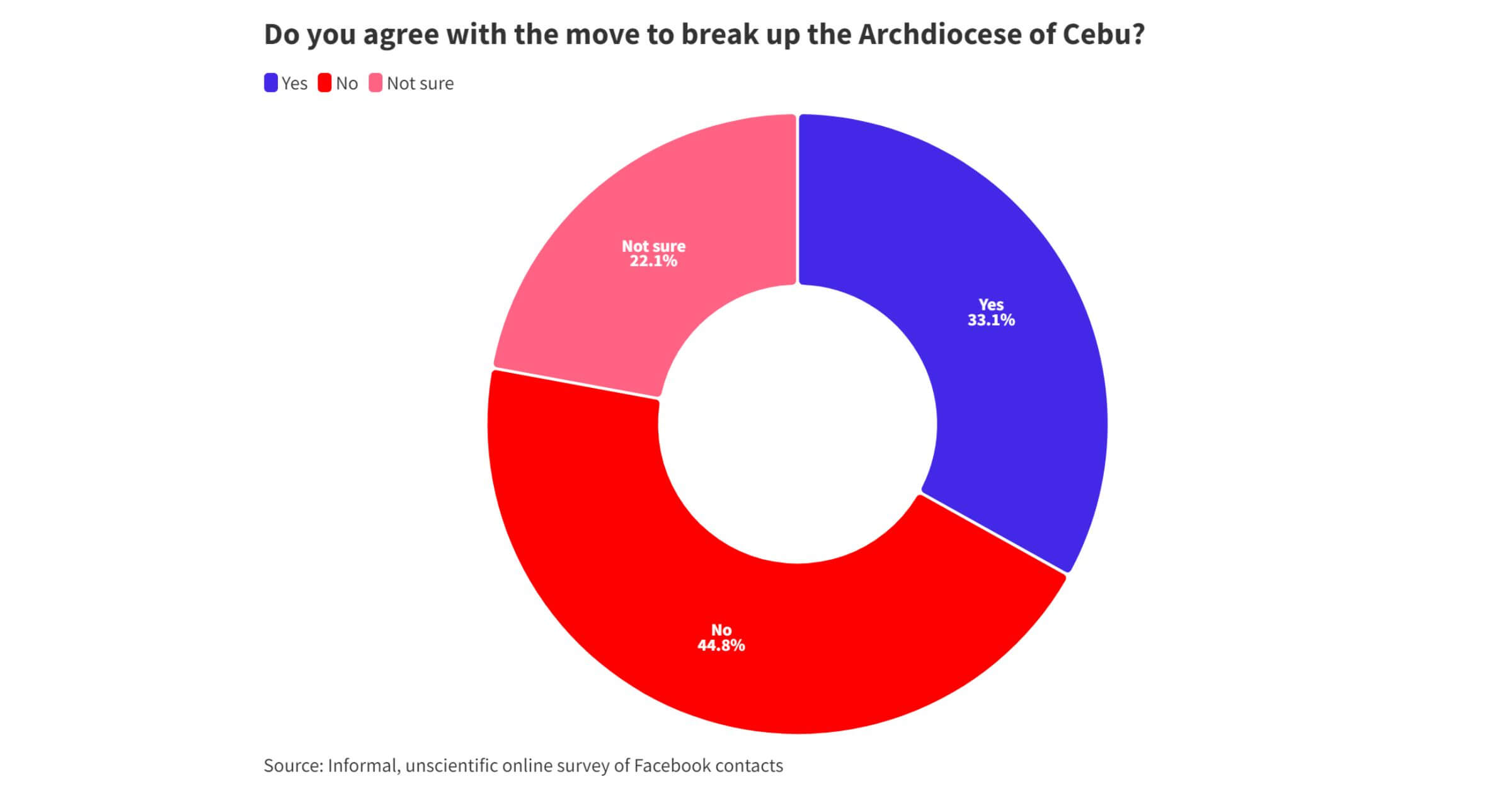I can’t find any report that indicates the level of popular support for Sugbuswak or the move to break up the Archdiocese of Cebu. I’m not sure if anyone in the Archdiocese is looking into that. Not that it matters because it’s practically a done deal.
The Church isn’t a democracy, Archbishop Jose Palma said during the first district consultation for Sugbuswak. Ultimately, it is the Pope who will decide, he said. Officials like the apostolic nuncio, Palma told reporters, have a louder voice.
But it’s curious that the Archdiocese isn’t getting the pulse of the wider Church people. Because It did so on a similar proposal during the time of Cardinal Vidal.
In the mid 2000s, several politicians wanted to carve out their own fiefdoms and Vidal publicly spoke out. He described it as “evil.”
Then archdiocesan media liaison officer Msgr. Achilles Dakay said surveys conducted after church masses showed that the opposition to breaking up the province was “overwhelming.”
The move was called, initially by opponents but ultimately by the general public, Sugbuak. That one word was a masterful piece of political propaganda by the Capitol.
Sugbuswak is 2023 Sugbuak
And to think that the very reason for the move by then termed-out congressmen Simeon Kintanar, Antonio Yapha, and Clavel Asas Martinez was to bring services closer to the people. It wasn’t that different from the stated reasons of Sugbuswak.
What does that say about the Archdiocese of Cebu? That it speaks out and rallies opposition against political moves to break up the Province of Cebu but tells people, albeit indirectly, “wa moy labot (you don’t have any say in this)” when it does decide to break up its own territory? Did anyone say ecclesiastical fiefdoms?
And it’s doubly puzzling when you consider that there are modern tools to get people’s sentiments. Online services now make it easier to be a “listening church,” which is the call of Pope Francis. Not that this hasn’t been tried in the Archdiocese of Cebu. When I was still with Cebu Caritas, we did an online survey for youth volunteers that told us young people listened to their parish priests, highlighting the latter’s importance in fighting disinformation.
Informal survey
With no media engagement on the issue from the Archdiocese, it’s hard to ask detailed questions about Sugbuswak. I decided to conduct my own survey that ran over this weekend to gauge people’s sentiments.
A few caveats:
- The survey is unscientific. I conducted it using Google Forms and sampling isn’t randomized – I tapped my online networks.
- This isn’t representative of the general population. My respondents are heavily skewed toward people engaged with the church – parishioners and volunteers. The makeup of the sample is enlightening because you’d expect an even higher support for Sugbuswak.
Quick insights as I went through the answers: those in far-flung parishes favor Sugbuswak. There are many who say consultation was inadequate but favor the breakup. Most rate their knowledge on the move at 3 – which isn’t a ringing endorsement – when in doubt, take the middle ground.
On the question of breaking up the Archdiocese of Cebu, this informal survey indicated just 33.1% support for the proposal. This is pretty low for a group of people that is very close to the church – lay volunteers, priests, even a sacristan who wasn’t aware of Sugbuswak. Most have never attended a consultation on Sugbuswak and 45.5% say consultations on the move were not adequate.
Here are the results of the survey that had 145 respondents.
Max is a journalist and blogger based in Cebu. He has written and edited for such publications as The Freeman, The Independent Post, Today, Sun.Star Cebu, Cebu Daily News, Philstar Life, and Rappler.
He is also a mobile app and web developer and co-founded InnoPub Media with his wife Marlen.


Leave a Reply